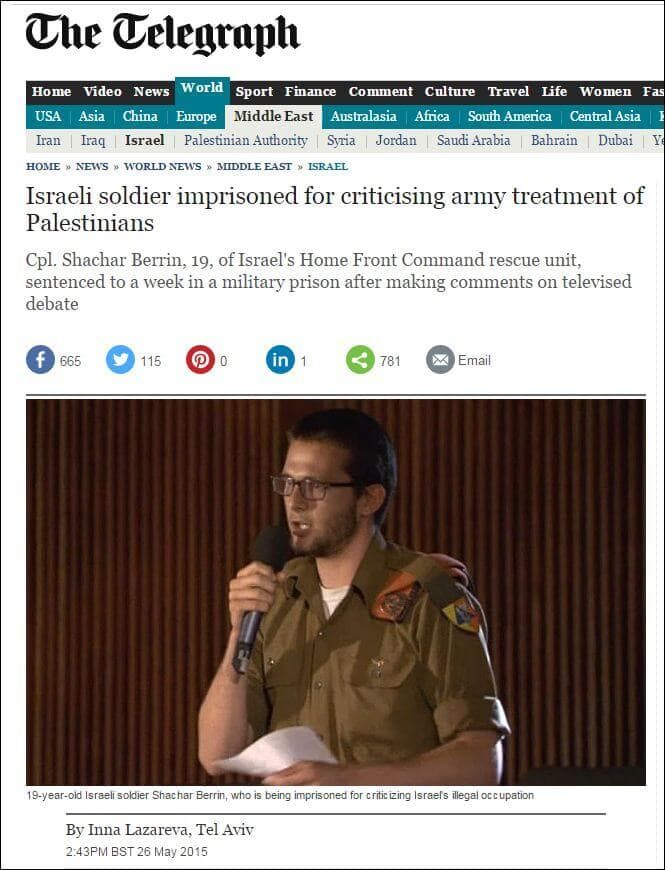UPDATE
Following correspondence with the Daily Telegraph, the offending headline has been promptly amended to more accurately reflect the story. The headline is still, however, arguable. After all, the soldier was imprisoned for an unauthorized TV appearance, not for his criticism of Palestinian treatment:
* * *
The Daily Telegraph reports on the imprisonment of an Israeli soldier after he appeared on a TV debate show in Jerusalem.
The headline would have you believe that the soldier was imprisoned as a result of highly critical comments he aimed at the behavior of the IDF. Shachar Berrin is effectively turned into a free speech martyr and Israel is portrayed as a society where criticism of the army lands you in jail, much as it would in a military dictatorship.
It’s only in the final paragraph of the article that this appears:
The IDF said that “the soldier was tried for expressing himself in the media without authority or permission, as called for by army orders.”
Indeed, Berrin was not arrested and imprisoned for what he said. Israel is a very self-critical society with freedom of speech and freedom of the press. Berrin would have been within his rights to say whatever he wanted were he not a serving soldier and plenty of former soldiers and reservists have publicly criticized the IDF in recent times.
The reality is very simple as outlined by these IDF regulations that are known and available to all IDF soldiers. These regulations are not about stifling of free speech or the opinions of soldiers but ensuring that the IDF remains a disciplined and organized body that is free from politicization.
This is common to many armies. In the U.S. Army, soldiers do not have the same constitutional rights to express themselves as civilians while the British Army’s regulations clearly state:
Members of the Army are not permitted to disclose Service information or express views on official matters or experiences to any media organisation without prior approval from the Ministry of Defence, sought through the chain of command; this includes leaking official information to the media. Besides being contrary to regulations, it is unprofessional and can damage the reputation and interests of the Ministry of Defence and the Armed Forces and, whether intentional or not, undermines the Army’s apolitical position.
We’ve translated from Hebrew some of the most relevant sections from the IDF’s regulations:
1. A soldier may not express himself in public, orally or in writing, on political or military matters, unless he was authorized to do so by the IDF Chief of Staff or the IDF Spokesperson’s Unit.
2. The soldier may not appear as a military representative before audiences outside of the IDF, may not attend any meeting, party or other event as a representative of the army, unless authorized to do so by the IDF Chief of Staff or the IDF Spokesperson’s Unit. …
7. A soldier may contact a newspaper on any matter relating to the areas of culture, science, health, etc., provided that the matter has no relation, directly or indirectly, with political or security issues, and it does not criticize any Israeli public body or any part of the Israeli public.
8. The soldier will execute his army duties in a manner that does not involve his personal opinions on subjects beyond his responsibility, authority and his profession, and especially not his personal views on publicly controversial issues of a political, social or ideological nature.
9. The soldier will ensure that in any public appearance (especially to mass media outlets) will be with prior approval, and will express a clear and unconditional loyalty to the values and rules of the IDF, reflect the IDF’s policies and decisions and will contribute to public confidence in the IDF.
Irrespective of what he said, Shachar Berrin broke these regulations and appeared in uniform in the media. That he was sentenced to only one week’s imprisonment says much about the light treatment that Berrin has received despite his indiscretion.
At a minimum, the Daily Telegraph should amend its headline to more accurately reflect the real story.




